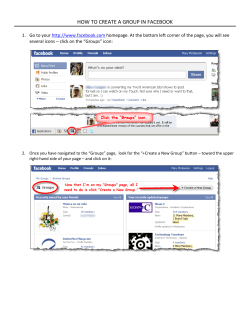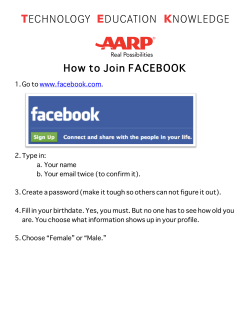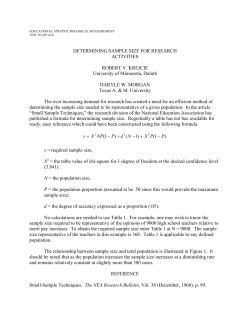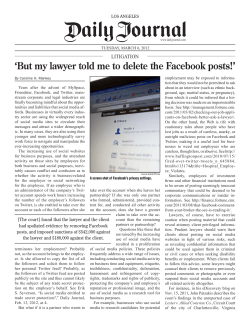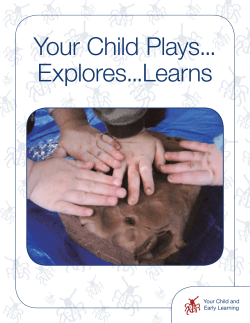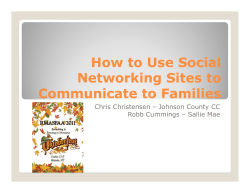
Sunday, March 10, 2013 • ◦
Why Can’t We Be Friends? Social Media Boundaries Between Teachers and Students | N... Sunday, March 10, 2013 News FeedComments NEA Today The National Education Association online news and information resource. • Home • About Search this website... SEARCH • Top Stories • Article by Topic ◦ Academics ◦ Census 2010 ◦ Charter Schools ◦ Child Nutrition ◦ Education Funding ◦ Education Support Professionals ◦ ESEA/NCLB Reform ◦ Health ◦ Health Care Reform ◦ Higher Education ◦ Homeless Students ◦ International Education ◦ Jobs ◦ Minority Community Outreach ◦ NEA ◦ NEA Headquarters ◦ NEA Priority Schools Campaign ◦ NEA's Read Across America ◦ Race to the Top ◦ Salary ◦ Social Issues ◦ Social Security ◦ State News ◦ Teacher Firings ◦ Teacher Quality ◦ Teachers Making a Difference • Must Reads • Ahead in Ed • NEA Media • Archive • NEA.org You are here: Home / Featured News / Why Can’t We Be Friends? Social Media Boundaries Between Teachers and Students Why Can’t We Be Friends? Social Media Boundaries Between Teachers and Students April 28, 2011 by clong Filed under Featured News, Top Stories 2 Comments Like 35 http://neatoday.org/2011/04/28/why-cant-we-be-friends-social-media-boundaries-between-... 3/10/2013 Why Can’t We Be Friends? Social Media Boundaries Between Teachers and Students | N... Page 2 of 6 By Cindy Long Around the country, school districts are grappling over guidelines that would govern how – and whether – educators should use social media. The key is finding a way to take advantage of the learning opportunities social media provides while striking the proper balance between protecting kids and preserving professional boundaries and First Amendment rights. That’s the struggle in Stonington, Connecticut, where the board of education is considering a new a policy. According to Superintendent Leanne Masterjoseph, “The policy has to err on the side of safety for kids.” But Gail MacDonald, chair of the Stonington Board of Education, said she did not “want to be in the speech-controlling business at all.” So what’s the solution? Maybe school boards should ask the educators themselves. William Jackson, a teacher and technology consultant in Jacksonville, Florida, says that just as there are First Amendment rights of teachers who participate in social networking, there are also privacy rights of students. “When educators put ourselves on display by writing something and putting it online, we are responsible and accountable for the content and motives,” he wrote recently on his blog, adding that “teachers should not post things that are private and confidential about a student.” His bottom line: If you feel comfortable saying it to parents and in public then you should be able to say it in a blog or on Facebook. This is simple, common sense advice for educators who want to talk about students on Facebook – but what about those considering using social media to talk to students? Brock Dubbels, a longtime educator from Minneapolis, Minnesota who regularly uses technology in the classroom, advises setting clear boundaries when it comes to social media. “Kids don’t need to see my backyard, or know what I say to my wife over dinner. When I have fun with friends and family, that’s a different me, and it’s important that I make that distinction,” he explains. “Being a professional means that I project the values of my profession and my employer when communicating with students.” He acknowledges that with the proliferation of social media, it can be difficult to make this distinction, but he insists that it must be made. If he gets friend requests from students, he deletes them. “I approach the student personally and thank them, but tell them that it is not appropriate for me to be a “friend” when I am their teacher and advocate,” he says. That’s not to say that social media has no place in the classroom. “Social networking a powerful tool for communicating and should not be ignored or rejected by the education community,” says Brian Rappe, a teacher in Burnsville, Minnesota. “I think school districts should set up guidelines to protect their employees and the district. Teachers should have separate sites – one for work and one for personal use and the two should never cross paths.” Gina Moretto Frutig, an educator in Durham, North Carolina, agrees. She maintains a separate Facebook page just for students and their parents. “I wouldn’t even let other teachers on it,” she says. “I used it to post field trip pictures and pictures of in-class activities. Many parents have access to it on their phones, so it was a convenient way to update everyone.” Ohio teacher April Stephenson Totten didn’t want any access at all to her student’s Facebook pages, so she uses Edmodo.com. http://neatoday.org/2011/04/28/why-cant-we-be-friends-social-media-boundaries-between-... 3/10/2013 Why Can’t We Be Friends? Social Media Boundaries Between Teachers and Students | N... Page 3 of 6 “It’s an educational social network that can be accessed on phones and ipods,” she says. “So far it works great for me.” If educators are still unsure how to handle social media in the classroom, and if the district has no guidelines or policy, Dubbels suggests looking at other district policies. But the first step is to carefully weigh the safety and educational benefits of social media. “If you’re not willing to look at safety and learning, don’t do it,” he says. Related posts: 1. 2. 3. 4. 5. Should Schools Be Teaching Social Media? Friend or Foe? Schools Still Struggling With Social Media How Video Games and Social Media Benefit the Classroom Must Reads – Using Social Media Social Media Helps Transition to College Tags: April Stephenson Totten, Brock Dubbels, Gina Moretto Frutig, social media in schools, social media teachers, teachers and facebook Comments 2 Responses to “Why Can’t We Be Friends? Social Media Boundaries Between Teachers and Students” 1. Bonnie says: May 9, 2011 at 7:28 pm I’d love to hear more about how this is playing out in school districts around the country. Like or Dislike: 2. 0 0 Lisa Mims says: July 18, 2011 at 7:30 pm I know teachers who have students as friends. What if you forget that a student is reading your posts? I teach 5th grade, and even though I tell my students that I will not be their friends on FB, they still send requests. I delete them, and that’s the end of that. As Mr. Dubbels said, there is my professional life, and my personal life. At times, we talk about my personal life in the classroom, but I will not have a student keeping up with my latest posts.I also use EDMODO, not Edmondo, in the classroom. It’s just like FB but with a lot more to offer. I keep in touch with my students during the summer with it. Like or Dislike: 0 0 Speak Your Mind Tell us what you're thinking... and oh, if you want a pic to show with your comment, go get a gravatar! Name (required) Mail (will not be published) (required) Website http://neatoday.org/2011/04/28/why-cant-we-be-friends-social-media-boundaries-between-... 3/10/2013
© Copyright 2025




